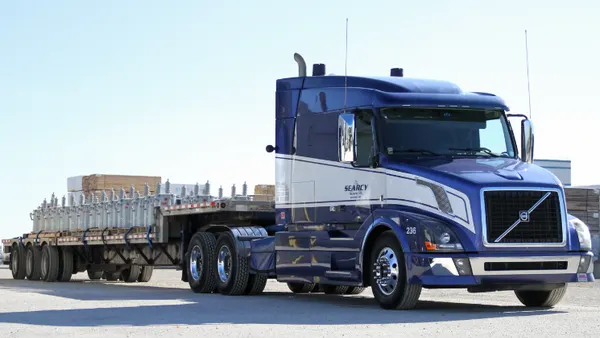Even after layoffs at C.H. Robinson late last year, the logistics giant’s ouster of longtime CEO Bob Biesterfeld came as a surprise to some academic observers of the industry.
Jason Miller, associate professor of logistics in the department of supply chain management at Michigan State University and Cliff Defee, associate professor of professional practice, supply chain management and director of the supply chain management program at TCU, gave their perspectives on the company’s recent action.
In phone interviews with Transport Dive, the experts noted the headwinds facing the freight transportation industry and what C.H. Robinson’s actions might indicate for 2023.
Editor’s note: This interview has been edited for clarity and brevity.
What do you think about CH Robinson’s decision to make a change at CEO?
JASON MILLER: It’s a surprise, but there is the reality that sector of the freight market has turned down very drastically over the past the six months or so. Prices have dropped almost 12% since June of last year. If we go back to the onset of the COVID recession, prices sort of peaked at the end of 2021 and early 2022. They were up 50%. Even today, prices in November were still up 23% that companies and freight transportation services were receiving. But when you come down 15% YoY, that's going to be a challenging environment.
However, I think there's no way around to say that the board was expressing concerns about some of the decisions that were made. C.H. Robinson had done a substantial downsizing in their workforce just a few months ago. So, I think it's difficult to interpret this any other way other than the board was a little disappointed with some of these strategic decisions that had been made, especially given the fact the environment did change fairly quickly.
CLIFF DEFEE: It’s interesting that this past year, all their financial results seem to be quite positive. Revenues are up, gross profit and earnings per share are all up. Stock prices are down about 10%. So, from the standpoint of how the business is being run, it appears that it's been run fairly well at least in the past 12 months, given the economy that we're dealing with. I know that they laid off 3% or 4% of their workforce recently. Again, the overall financial numbers appear to paint a pretty positive picture. So, what it says to me is it looks like he was let go. But the rationale isn't clear to me at all.
The person that's replacing him is the former chairman of the board. I would see him as a short-term solution, while the company goes out to find someone to take the full-time job.
What does making a change at the top say about the company’s direction for 2023?
MILLER: C.H. Robinson has been around for so long. They've got such a strong customer base. To me, it's not something that I'm too concerned about, because it's a company with such a history, such scale and size, such an established customer base to me, there's far fewer concerns. I would be much more worried if they were a much younger, smaller player.
DEFEE: Biesterfeld appeared to be focusing on some technology advancements. I don’t think they'd pull back from that. There's nothing that is referenced that I could find that suggests that any of these technology investments haven't paid off, or they haven't been run well. But I wouldn't think anybody in 2023 is actually going to walk away from technology or move away from producing technology to run their business effectively. They also cut back on staff, so they were concerned about their personnel costs.
If in fact there's a recession, then that's going to have a negative impact on the amount of freight globally and around the country. So, if that happens, then stay true to your core business, which is freight brokerage. Freight brokerage is an industry that is not difficult to get into, with lots of small competitors. C.H. Robinson is the big player in the industry, so I would think they would weather it fairly well and the smaller guys would be the ones that would suffer.












